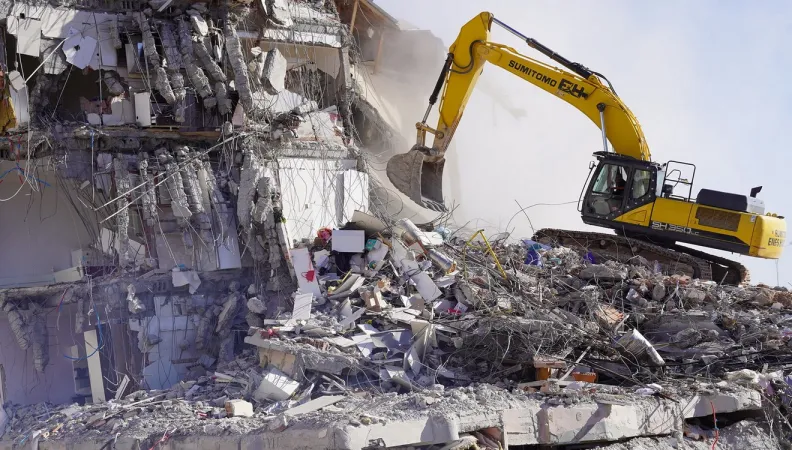Share the page
Fighting Fake News in the Middle East: the Surprising Benefits of Fact Checking
Published on

Following the earthquakes that devastated communities across Turkey in February, misinformation spread rapidly, exacerbating the emotional toll it took on victims and families. Fact-checkers around the region, as part of the Qarib project, rallied to combat the surge in fake news. Ahead of International Fact Checking Day this Sunday, we highlight new initiatives and tools that promote accuracy in media.
A video claiming to show an exploding nuclear power plant was viewed more than 1.2 times, and some 300,000 people watched another video claiming to depict a tsunami striking Turkey’s shores – just two of the many such false constructions to have spread across social media after Turkey’s earthquakes in February.
In the Middle East, the Qarib project, financed by AFD Group in the framework of the Minka Peace and Resilience Fund and implemented by Canal France International (CFI), supports the media in Jordan, Lebanon, Iraq and Palestine. It aims to restore confidence in the media by supporting their independence and their role in fighting misinformation. Qarib is collaborating with Arab Reporters for Investigative Journalism (ARIJ) whose mission is to stimulate investigative journalism and transparency.
Restoring faith in the news
We interviewed Rawan Damen, ARIJ Director General, and Henrik Ahrens, Qarib program director at CFI, to gain insight into fact-checking activities, the challenges – and its future in an era of digital technology and artificial intelligence.
“After the earthquakes in Turkey, we started noticing fake news circulating in Arabic, with photos and videos from other disasters, including unfortunately, hate speech towards minorities and refugees,” said Rawan. In response, ARIJ, through its Arab Fact-Checkers Network (AFCN), set up a hotline in Turkey and Syria to verify any news received in Arabic quickly before it is published or disseminated.
Rawan Damen emphasized the importance of pre-publication fact checking because “most of the people will always remember the fake news, not the [corrected version].” ARIJ has developed a strict pre-publication policy involving close collaboration between fact-checkers, editors and journalists, in addition to crosschecking findings and data collection from the field.
Further reading: Launch of the Qarib Project: France Pledges to Support Lebanese Media Outlets in the Face of Crises
The elusiveness of reliable information
The biggest challenge was the sheer volume of information shared, and the lack of scientific and specialized knowledge among fact-checkers, who will need more targeted training. “The verification process doesn't necessarily stipulate that they become thematic experts, but the training [that we offer] consists of ensuring that they know whom to talk to, or how to triangulate information in order to verify it,” says Henrik Ahrens, referring to the training offered by Qarib. “This is tackled in the capacity building and consultancy that we provide to media outlets, including the support of well-researched, in-depth or data-driven coverage.”
There is also the oft-neglected emotional toll that disasters and trauma can take on journalists. “Many fact-checkers are not trained to deal with the mental toll of fact-checking,” says Damen, especially when faced with graphic images of events such as the recent earthquakes and the desperate search for survivors. She called for more support to ensure the well-being of those working in the field.
Even before people set about falsifying videos and documents, accessing information in the first instance can be very difficult, particularly in regions where it is not readily available. Data journalists and fact checkers have to gather information from the field, which can be time-consuming, costly and sometimes dangerous.
As technology evolves, fact-checkers need to adapt and develop new tools to keep-up with the changing media landscape. Artificial intelligence and machine learning may help.
Further reading: How AFD contributes to the freedom of information around the world
Over to you, dear reader
Readers will themselves also need to be better equipped to distinguish real from false information. It’s part of the “media and information literacy and critical thinking [that should be taught] in schools and universities,” says Henrik. Existing initiatives need to be scaled up, so that current and future generations can navigate through the complex discourses and “critically assess the information and narratives they are getting”.
In fact, awareness of misinformation is already evolving. Many comments from users who saw the videos of the tsunami and the exploding nuclear power plant raised questions of their authenticity. This is something to build on.
By supporting media development initiatives in the Middle East, AFD seeks to enhance the capacity of local media organizations and journalists in Irak, Jordan, Lebanon and Palestine, to produce high-quality, fact-based news and information.
Find out more about the Qarib project and its activities in the region here
